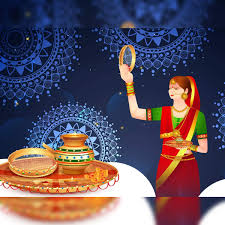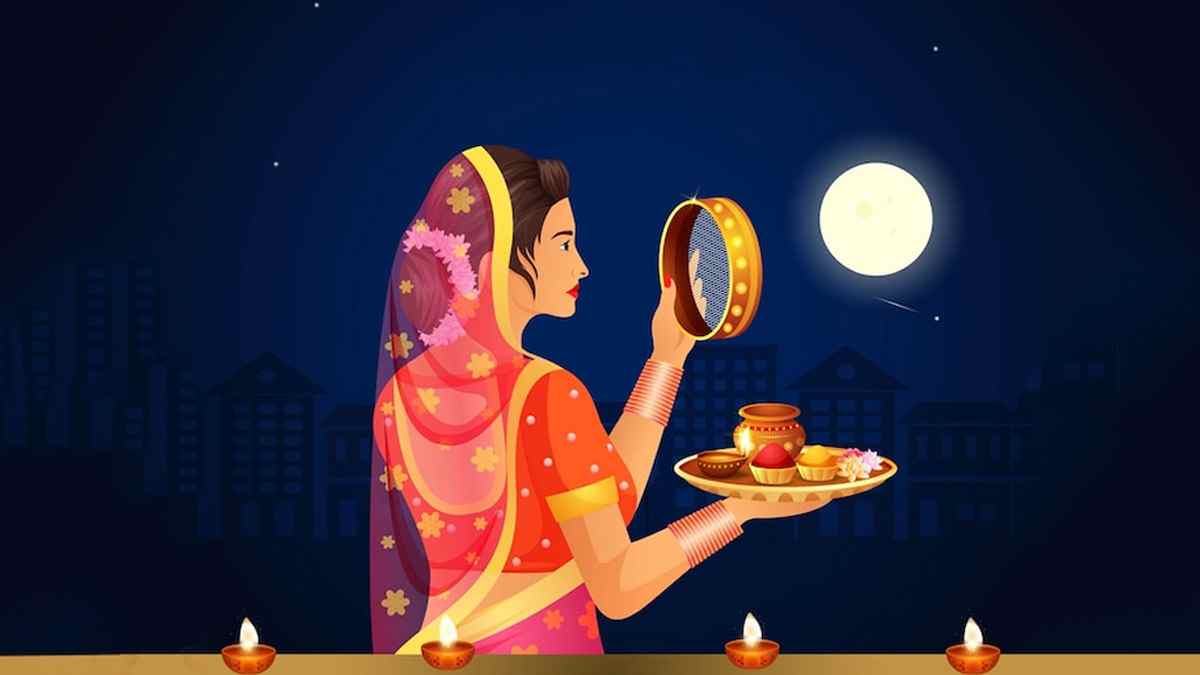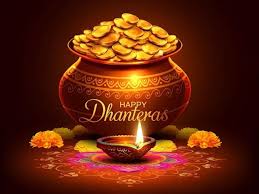How to Perform Karwa Chauth Ritual at Home 2024 : A Guide for Londoners
Karwa Chauth is a festival celebrated with great devotion by married women, especially in the Indian community, who fast from sunrise to moonrise for the long life and well-being of their husbands. While temples and community centers may host group celebrations, many women in London prefer to perform the Karwa Chauth pooja in the comfort of their own homes, maintaining the essence of the festival while adapting to their urban lifestyles.

Preparing for Karwa Chauth Pooja at Home
1. Setting Up the Pooja Thali One of the most important aspects of the pooja is preparing the Karwa Chauth thali, which contains everything you’ll need for the rituals. Here’s what you’ll need to place on your thali:
Karwa (Clay or metal pot): Filled with water, this is used during the pooja.
Sieve: Used during the moon-watching ritual.
Diya (Oil lamp): Symbolizes light and prosperity.
Roli and rice (for tilak): For applying on the deity and the Karwa.
Sweets or fruits: For offering during the pooja.
Chalni (Sieve): This is used when viewing the moon and your husband during the ritual.
Flowers and incense sticks: To complete the pooja setup.
You can buy these items from local Indian stores in areas like Southall or Wembley, or order them online to be delivered to your home.
Dressing Up for the Pooja
Dressing Up for the Pooja Dressing up in beautiful traditional attire is an integral part of Karwa Chauth. While many women in London choose to wear saris or lehengas, fusion outfits are also becoming popular. Make sure to adorn yourself with bangles, jewelry, and apply mehndi (henna) on your hands. You can get mehndi applied at local salons or DIY with pre-made cones available at Indian markets.

Step-by-Step Guide for Karwa Chauth Pooja at Home
1. Morning Rituals (Sargi) The day starts before sunrise with the sargi meal, which is traditionally given by the mother-in-law. This meal provides energy to sustain the fast throughout the day. In London, many opt for homemade sargi or order a specially prepared sargi thali from Indian restaurants or caterers.
2. Preparing the Pooja Area Set up a clean and sacred space for the pooja. You can do this in your living room or any quiet area of your home. Place a small idol or picture of Lord Shiva, Goddess Parvati, and Lord Ganesha on a clean platform. Light a diya (lamp) in front of the deities, offering them flowers, sweets, and fruits.
3. Performing the Evening Pooja The main Karwa Chauth pooja is performed in the evening, just before the moonrise. Here's how to conduct it at home:
Step 1: Begin the prayers by offering prayers to Lord Shiva and Goddess Parvati, asking for their blessings for your husband's long life.
Step 2: Listen to the Karwa Chauth Katha (story). You can read it from a printed book, or find audio and video versions online. This story tells the significance of the fast and the blessings it brings.
Step 3: Offer water from the Karwa to the deities and sprinkle some around the room to purify the space.
4. Moonrise and Breaking the Fast Once the moonrise time is confirmed (approximately 7:06 PM in London for 2024), go to an open space, like your balcony or garden, where you can view the moon. Use the sieve to look at the moon, then at your husband’s face through the sieve. Offer prayers to the moon and your husband for his long life. Then, your husband will offer you a sip of water and a sweet, marking the end of your fast.
Tips for Londoners Celebrating Karwa Chauth at Home
1. Check the Moonrise Time The moonrise time can vary slightly depending on your location in London, so check local sources or apps to confirm the exact time. In 2024, the expected moonrise is around 7:06 PM in London.
2. Sargi and Post-Fast Meals Many Indian restaurants in London offer sargi thalis and post-fast meals, so you can enjoy a traditional meal without worrying about cooking after a long day of fasting.
3. Join Virtual Pooja Groups If you miss celebrating with family or friends, consider joining online pooja groups or live streams, where you can connect with others observing Karwa Chauth.
Conclusion
Celebrating Karwa Chauth at home in London can be a beautiful and intimate experience. By following these simple steps, you can honor the festival's traditions while adapting it to your modern London lifestyle. Whether it’s dressing up, performing the pooja, or waiting for the moonrise, the essence of Karwa Chauth lies in the love and devotion behind the rituals.
Recent Posts
4 Days of Pongal 2025, Dates, Rituals, Story, Timings
Pongal is a four-day festival celebrated in Tamil Nadu and across Tamil communities globally to express gratitude to nature for a bountiful harvest. The festival, dedicated to the Sun God, Surya, marks the beginning of the Tamil month of Thai and the harvest season. In 2025, Pongal will be celebrated from Tuesday, January 14 to Friday, January 17. The four days are: Bhogi (January 14, 2025), dedicated to Lord Indra and marking the clearing of old possessions; Thai Pongal (January 15, 2025), the main day for thanking the Sun God for the harvest; Mattu Pongal (January 16, 2025), honoring cattle for their role in agriculture; and Kaanum Pongal (January 17, 2025), a day for family reunions and social celebrations. These days are filled with rituals, significance, and joy, reflecting the rich cultural heritage of Tamil communities worldwide.

Ahoi Ashtami 2024 UK | Is Ahoi Ashtami on 23rd or 24th | Celebrating the Wellbeing of Children
Ahoi Ashtami, a revered festival for mothers, will be celebrated on Wednesday, October 23, 2024. This festival holds special significance for women who fast for the health and wellbeing of their children. Traditionally observed for sons, the modern-day observance includes prayers for the wellbeing of both sons and daughters. The fast is broken during twilight after sighting the stars in the sky, which will occur at 18:24 in London on this day. For those who follow the custom of breaking the fast after moonrise, the moon will rise at 22:14 on Ahoi Ashtami.
Ahoi Ashtami 2025 UK: Date, Time, and Rituals for Wellbeing of Children
Ahoi Ashtami, a significant Hindu festival dedicated to the wellbeing of children, will be celebrated on October 13, 2025. The festival, observed mainly by mothers, involves fasting and performing prayers for the health and prosperity of sons and daughters. The Ahoi Ashtami Puja Muhurat for 2025 is from 18:11 to 19:30 (UK time). This auspicious occasion is marked by devotion and rituals, with many families gathering to perform the prayers at home or at community temples.
Chaitra Navratri 2025 : Date , Calendar and Events in UK
Chaitra Navratri 2025 will be celebrated from March 30 to April 6. For Hindus in the UK, this auspicious nine-day festival is not just a time for religious devotion, but also a meaningful cultural celebration marking the Hindu New Year and the arrival of spring. Also known as Vasanta Navratri, it honours the nine forms of Goddess Durga, symbolizing strength, renewal, and feminine power. In this article, we explore the dates, rituals, significance, and special events happening across the UK for Chaitra Navratri 2025.

Dhanteras 2024 UK: Date, Auspicious Time, Traditions, and Celebrations
Dhanteras 2024 will be celebrated on October 29 in the UK. The auspicious time for Dhanteras puja is from 7:04 PM to 8:27 PM. Discover the significance, traditions, and events happening in London to celebrate this festive occasion.